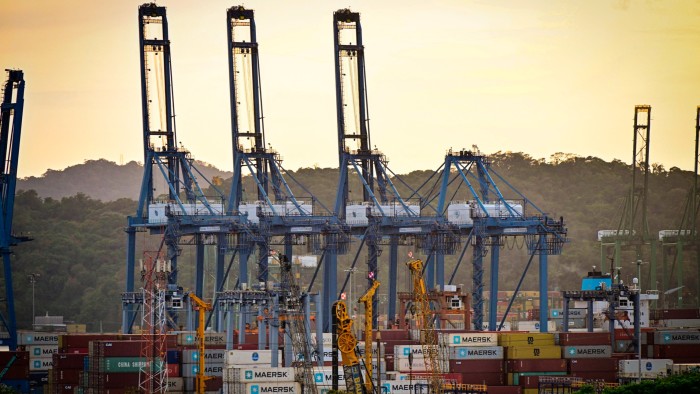Unlock the Editor’s Digest for free
Roula Khalaf, Editor of the FT, selects her favourite stories in this weekly newsletter.
CK Hutchison’s $23bn ports sale produced the Hong Kong conglomerate’s best one-day gain in almost 10 years when it was announced in March, and was reminiscent of the swashbuckling transactions that made founder Li Ka-shing’s name. The ongoing negotiations with Beijing, which has come out in opposition to the sale, reflect a more prosaic reality.
As initially presented, the sale of CK’s ports outside China to a group including BlackRock would net $19bn in proceeds — as much as again as its undisturbed market capitalisation. In return, it would offload a unit that last year made up 9 per cent of revenue. When the news first broke CK shares jumped 22 per cent, their third-best day ever, just behind the stir caused by an internal reorganisation in 2015 and a 1998 feng shui-like boost from a roaring market following the lunar new year break.
For the past two years, CK has been trading at less than half of book value and before this deal it was at a mere third — its lowest this century. A hefty conglomerate discount is one reason given its mix of retail, telecoms and infrastructure assets across 50 countries.
But its Hong Kong home is another, bigger issue. Nine years ago CK experienced its first public bar to an overseas bid on the grounds it was Chinese and a security risk. That has become more common for Hong Kong companies since. CK’s problematic ports deal shows that the risk is now that Beijing will directly block its activities.
China has attacked the deal, which was prompted by US President Donald Trump’s opposition to “Chinese” ownership of the ports bookending the Panama Canal. Both buyers and the seller are reported to be examining what might pacify China.
The port sale matters beyond its size. Proof of a renewed appetite for dealmaking could help CK realise value trapped in its other divisions. It would be the biggest deal done by the company since Li handed over the reins in 2018 to his son Victor. In size, it harked back at least a decade to when CK kick-started a wave of mobile telecoms consolidation in Europe.
Apart from CK, Hong Kong’s hongs, or trading houses, ceased to be reliable sources of banker fees years ago. Earlier this year Jardine Matheson, the famous colonial-era powerhouse, even publicly badged itself merely a long-term investor, rather than a builder of businesses.
CK’s dealmaking continues — this week in the UK, for example, it completed the £16.5bn merger of its Three mobile network with Vodafone. But its port tribulations show that, in a world of superpower politics, the role of the corporate swashbuckler has become much diminished.
